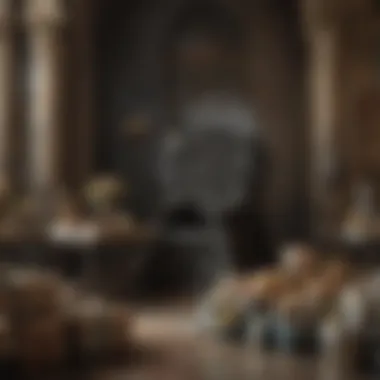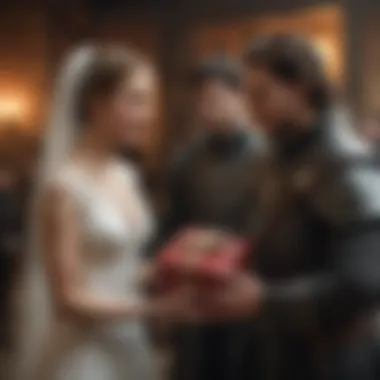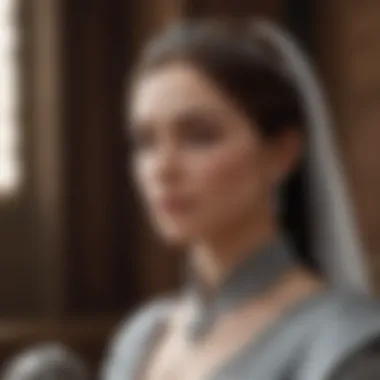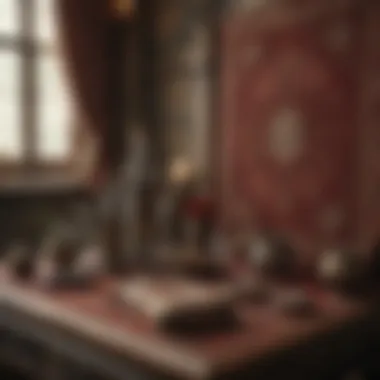Game of Thrones Wedding Gifts: Meaning and Impact


Intro
The world of Game of Thrones is a tapestry woven with threads of loyalty, betrayal, power, and tradition. Amidst the backdrop of political alliances and familial ties, wedding gifts emerge as a significant motif, embodying intricate symbolism and cultural nuances. These tokens exchanged during nuptial ceremonies serve not just as material offerings but as reflections of deeper relationships, conflicts, and historical legacies. The gifts vary from opulent treasures to simple mementos, yet they collectively enhance the understanding of character intentions and the broader socio-political landscape of Westeros.
Within the realm of Game of Thrones, wedding gifts encapsulate the narratives of both the givers and receivers, revealing much about their motivations and the circumstances surrounding their exchanges. Are these gifts merely ceremonial obligations, or do they signify something far more profound? This exploration aims to peel back the layers of meaning behind these offerings, shining a light on how they connect to the overarching themes of loyalty, power, and tradition.
Character Dissections
Key Characters and Their Gifts
The significance of wedding gifts is perhaps best understood through the lens of pivotal characters who navigate the volatile waters of Kings Landing, Winterfell, and beyond. Each character’s gifting choices reveal their desires, aspirations, and often their hidden agendas.
Take Tyrion Lannister, for example. When he presents Sansa Stark with the gift of a necklace at their wedding, it serves as a symbol of both his protective instincts and his own entrapment within the Lannister family's power dynamics. Through this gesture, we glimpse his complexities—simultaneously a pawn and a player in a game larger than himself.
Similarly, Cersei Lannister uses her gifting power to manipulate alliances. During her marriage to King Robert Baratheon, the presents she bestows carry the weight of expectation and loyalty, revealing her strategic mind in positioning herself and her children within the royal court. The gifts transcend mere tokens; they become tools of influence.
Character Evolution Through Gift Giving
The act of giving, particularly in wedding contexts, illustrates how characters evolve throughout the series. For instance, Jon Snow, a character marked by his struggles with identity, offers a simple yet profound gift—a sword to Ygritte. It embodies his conflicting loyalties to the Night's Watch and his love for the wildling woman. As the narrative unfolds, each gift becomes a checkpoint in character development, highlighting their emotional arcs and the choices that define their fates.
Narrative Impact
The interplay of these characters and their gifts shapes the narrative dramatically. The significance is not in the items themselves but in the implications they carry. Audiences witness how alliances shift, tensions escalate, and relationships are forged or broken based on these gestures. This interrelationship between the gifts and character actions sheds light on the broader themes of loyalty and the quest for power, underscoring how wedding gifts resonate through the storyline in both visible and subtle ways.
"In the world of Game of Thrones, every object can hold the weight of history, and every gift can change the course of a life."
The gifts exchanged may seem like mere formalities, yet they offer a rich lens for analyzing character motivations and essential plot points. As we continue our exploration, we will delve deeper into specific episodes featuring memorable weddings, unpack the lore surrounding these displays of affection, and even ponder fan theories that arise from them. The following sections aim to provide a comprehensive understanding of how wedding gifts not only fit into the narrative puzzle but also reflect the enduring dynamics of a world steeped in intrigue.
The Significance of Wedding Gifts in Westeros
In the world of Westeros, wedding gifts extend beyond mere tokens of affection; they embody cultural nuances, power plays, and intricate social dynamics. When characters exchange gifts during weddings, they do so in a calculated manner, directly correlating the present with sentiments, statuses, and sometimes hidden agendas. The weighted implications of these gifts reflect the values and traditions upheld in the realm, highlighting the importance of relationships and alliances. As the narrative unfolds, these gifts weave a rich tapestry that clarifies the multi-layered relationships among characters, influencing the journey of individuals and the politics of the kingdom alike.
Cultural Context of Gift-Giving
In order to comprehend the significance of wedding gifts, it’s crucial to step into the cultural backdrop of Westeros. In a society steeped in traditions, the act of gift-giving carries weight. Weddings often symbolize a union not just between two individuals but two families, clans, or houses. Gifts serve as a form of communication—a way to assert loyalty, respect, and goodwill. For instance, the ceremonial sword gifted to a bride may symbolize not only personal honor but also a pledge of fidelity that goes beyond emotional ties, denoting deeper ties to family lineage.
Moreover, the act of presenting gifts at weddings can often be regarded as a public declaration of support and commitment. In a patriarchal society like Westeros, these gifts often hold implications tied to inheritance and power. A well-crafted piece of jewelry might signal to the world that the recipient is valued and protected, while also reinforcing the status of the giver's house. Therefore, understanding the cultural context of gift-giving is paramount for discerning fanatics seeking to grasp the underlying motivations of characters.
The Power Dynamics of Wedding Gifts
When it comes to the intricate world of Westeros, wedding gifts don’t abide by an ethical code; rather, they form a matrix of power dynamics that intertwine politics with personal sentiment. Gifts exchanged during marriages may also carry an element of political maneuvering. Significant gifts like lands or valuable items act as bargaining chips, negotiating alliances or solidifying peace treaties. The stakes are often high—one misstep could lead to betrayal or conflict among powerful families.
Additionally, the efficacy of these gifts often lies in their perception. Consider a lavishly decorated dagger presented at a wedding: while it may seem ornamental, it possesses the darker potential of being a weapon of betrayal. In this sense, gifts serve dual purposes; they can create bonds while also possessing the capability of severing them. Thus, those intricacies should be closely examined, especially in a narrative enriched with political intrigue like Game of Thrones.


"Gifts reveal more than one's feelings; they expose loyalty, ambition, and ultimately, the game of thrones itself."
In summary, the significance of wedding gifts in Westeros transcends their physical form, merging emotional bonds with power struggles. Understanding this nuanced interplay is crucial for comprehending the undercurrents that drive the characters and plot forward in the epic saga that is Game of Thrones.
Notable Wedding Scenes in Game of Thrones
The wedding scenes in Game of Thrones are not just ceremonies marked by vows and celebrations; they are potent narratives filled with political maneuvers, personal betrayals, and thematic explorations. They serve as turning points in the storyline, illustrating how these significant moments can change the course of characters' lives and the broader political landscape of Westeros. The gifts exchanged during these weddings offer more than mere tokens of affection—they carry deep layers of meaning, reflecting loyalties, ambitions, and the harsh realities of the world that the characters inhabit. Understanding these scenes provides lively context for the gifts given, revealing how they embody the characters’ relationships and the socio-political stakes at play.
The Red Wedding: A Turning Point
When talking about memorable wedding scenes, one cannot overlook the infamous Red Wedding. This event stands as a pivot that changes everything. What begins as a celebration of the Stark and Frey alliance within the grand hall of the Twins quickly turns bloody, showcasing the brutality that defines Westeros. The murder of Robb Stark, his mother Catelyn, and numerous followers highlights the dark side of wedding gifts—loyalty can quickly turn to betrayal.
The wedding presents exchanged here contrast sharply with the aftermath. Instead of traditional gifts symbolizing kinship and love, this wedding leads to a massacre, illustrating how gifts can represent shattered alliances.
"The Red Wedding was shocking, not just for its violence but for its clever manipulation of expectations around love and family in Westeros."
The significance of the gifts exchanged before the slaughter is profound. They symbolize the fragile nature of trust in a world rife with ambition and revenge. The dagger given to Robb Stark, once meant to signify loyalty and equality, later emerges as a cruel reminder of how easily bonds forged in love can be severed.
Joffrey and Margaery: A Union of Ambition
The wedding of Joffrey Baratheon and Margaery Tyrell is layered with ambition and intrigue. Unlike many other weddings, this one operates on a much grander scale, showcasing the wealth and power of the Tyrell family. The gifts presented in this context become a reflection of political strategy rather than mere affection. Margaery’s gifts to Joffrey are meticulously thought out, and each one is aimed at winning the young king’s favor while solidifying her own position.
Conversely, Joffrey’s gifts reflect his brutality wrapped in opulence. The crossbow he gifts to his bride, alongside the promise of protection, suggests a relationship founded on dominance rather than mutual respect. This is a telling example of how gifts during weddings can transcend personal significance, transforming into tools of manipulation in the complex game of thrones.
The underlying theme here revolves around power—how it is attained through marriage and how gifts at such nuptials speak to the alliances forged in the corridors of power.
Robb Stark and Talisa Maegyr: A Love Story
Robb Stark's wedding to Talisa Maegyr, unlike the previous events, resonates with a more romantic note. The gifts exchanged between them represent sincere affection and genuine emotion, layered with the nuances of duty and tradition. Talisa's acceptance into the Stark family through this union is marked by tokens that symbolize her love for Robb and her acceptance into a world fraught with conflict.
Unlike other weddings that feature betrayal or political machinations, this ceremony draws attention to intimacy amidst turmoil. The gifts they exchange are rooted in personal significance, illustrating how innocence can exist even in a world dedicated to war.
The focus on the heartfelt nature of these gifts stands as a reminder that, even when surrounded by the game of thrones, love remains a powerful force driving characters’ actions, although ultimately it becomes overshadowed by the impending tragedy of the Red Wedding.
Through these varied wedding scenes, Game of Thrones presents a rich tapestry that intertwines the gifts exchanged with the underlying currents of loyalty, ambition, and legacy, offering a profound exploration of what it means to give and receive in a land governed by often brutal realities.
Symbolism Behind Gifts in the Series
The series Game of Thrones artfully blends rich narratives with profound symbolism, and wedding gifts serve as a crucial thread in this tapestry. They are often more than mere tokens; they transcend their physical form to encapsulate emotions, allegiances, and the ever-shifting power dynamics of Westeros. In the grand scheme of things, these gifts highlight the underlying themes of loyalty and tradition, setting the stage for character development and plot progression.
Weapons as Wedding Gifts
Swords of Honor and Betrayal


When it comes to weddings in Westeros, what better gift to share than a sword? A sword symbolizes both honor and betrayal, making it a potent gift choice. For instance, when Jon Snow receives Longclaw, the sword initially belonged to his ancestor. This not just embodies a connection to legacy, but resonates with themes of responsibility and expectation.
The duality of swords is compelling. While they represent honor in the hands of a worthy bearer, in the wrong hands, they can shatter bonds of trust. This complexity offers readers insights into the characters’ motivations and looming conflicts. It signifies that gifts, while presented with good intentions, can carry weighty implications.
The Weight of Legacy
In the realm of Game of Thrones, every sword has a history, and with it, a legacy. The idea that a wedding gift could hold historical significance intensifies its value. Legacy entwined with wedding gifts reflects the unending stories of families along with their accomplishments and failures. A good example comes from House Stark; their ancestral sword, Ice, is an emblem of both power and downfall.
This weight of legacy ensures that each gift does not merely serve its purpose as a tool but as a narrative device that elevates a character's journey. Readers grasp the significance not just in terms of combat, but in the influence these legacies have on current events. The sword is a reminder of what was lost and what could be gained through bloodlines and history.
Jewelry as Tokens of Affection
Rings of Power and Influence
Jewelry often conveys a depth of meaning, especially when it comes to wedding ceremonies. Gold and precious stones symbolize an exchange of power and influence. A classic case is the engagement ring given to Sansa Stark. This piece represents a crucial alliance blended with personal sentiments. The sparkle of each gem carries weight—to stand for commitment, yet reflects the often hidden manipulations of great houses.
Rings encapsulate a mixture of hope and danger, especially when considering characters like Joffrey Baratheon. His power showcased through the rings he gifted does not mask his underlying cruelty; the seemingly innocent act is juxtaposed with the potential for control.
Necklaces: A Connection to the Past
When you think about necklaces given during weddings in Game of Thrones, they hold profound connections to the past. Take the necklace gifted to Margaery Tyrell by her mother. This jewelry serves as more than art; it's a reminder of duty and familial expectations. Necklaces connect characters to their roots, to betrayals, and to the legacies they carry.
In essence, necklaces signify bonds that exist beyond the present moment. They operate as physical chains that tie couples to their lineage, making them essential pieces of storytelling within the series. In carefully crafted moments, this connection can evoke nostalgia, assurance, or even a sense of impending doom.
The gifts offered during weddings do not merely blend into the backdrop of the series; they pulsate with meaning and showcase the intricate web of human relationships in Westeros.
Through analyzing these symbols, readers can get a clearer picture of how deeply intertwined gifts are with the plot and characters. Each presents an opportunity for exploration into the motivations, loyalties, and the ever-evolving landscape of power within the world of Game of Thrones.
- Bridging ideas of tradition with the stark realities of ambition, these wedding gifts echo throughout the narrative, making them significantly more than just artifacts.
The Role of Wedding Gifts in Character Development
The intricate fabric of character growth in Game of Thrones is often woven with the threads of wedding gifts, which hold a deeper significance in the narrative. Wedding gifts are not merely tokens of affection or symbols of union; they often reveal the characters’ personal loyalties, ambitions, and transformations throughout the saga. Such gifts serve as pivotal elements that signal underlying motivations, driving character dynamics and showcasing how relationships evolve over time in the brutal setting of Westeros.
Revealing Loyalties through Gifts
Wedding gifts in Game of Thrones often double as barometers for loyalty. They are imbued with meaning tied to the giver’s intentions and sentiments. For example, when Joffrey Baratheon gave Margaery Tyrell a lavish necklace, it wasn’t just a matter of courting her; it also symbolized his effort to align with House Tyrell to solidify his own power. Gifts can thus act as veiled communications about where one’s true allegiances lie. In the harsh political climate of Westeros, where betrayal lurks around every corner, such gestures are fraught with complications.
Moreover, the act of giving a gift can reveal a character’s changing loyalties. Take Robb Stark’s gift of a direwolf pelt to his bride Talisa. This was not merely a nod to his Stark lineage but showcased his commitment to building a life with her, indicating a significant shift from his original betrothal to one that was based on love rather than political gain.
"In the world of Westeros, a gift can encompass an oath, an alliance, or even a death sentence."
Similarly, the ritual of gift-giving is laced with layers of hidden meanings that can unveil shifting alliances. When characters present gifts to one another, they articulate something more profound—whether it’s a show of trust, a declaration of love, or an acknowledgment of past loyalties. Each exchange contributes richly to the viewer’s understanding of characters, their motives, and the stakes involved in their relationships.


Gifts Reflecting Character Arcs
Gifts often illuminate the character arcs that are explored throughout Game of Thrones. They can show how a character has grown, deteriorated, or changed their perspective. The contrast in gift exchange can be quite telling; for instance, compare Khal Drogo’s gifts to Daenerys Targaryen. Initially, Drogo offered her elaborate items, showcasing his wealth and power, yet as Daenerys grew into her own, her gifts became expressions of strength and independence, symbolizing her evolution into a formidable leader rather than just a pawn in someone else's game.
In another poignant example, consider Sansa Stark. The gifts she received over the course of the series reflect her tumultuous journey from a naïve girl dreaming of courtly life to a diligent strategist within the game of thrones. A simple necklace from Joffrey transforms in meaning from a sign of her initial picture-perfect desires to a reminder of her captivity and strife. The same gift, over time, takes on an entirely new significance as she learns to navigate the treacherous currents of power.
Through the lens of wedding gifts, one can discover how characters adapt, manipulate, and thrive amid the often deadly realities of their world. Gifts become markers of change, allowing viewers to witness the development of characters in ways that dialogue often can’t convey. Each exchange adds depth to their journeys, making us reflect on the complex interplay between gifts, loyalty, and character evolution.
Overall, the role of wedding gifts in character development in Game of Thrones is multifaceted and significant. These gifts encapsulate the essence of relationships, serve as reflections of character intentions, and signal transformative moments throughout the series.
Fan Theories about Wedding Gifts
The concept of fan theories, particularly in the context of wedding gifts, adds an intriguing layer to the rich tapestry of Game of Thrones. Such theories not only spark discussions among viewers but also deepen the understanding of character motivations and narrative direction. By exploring these theories, we can gauge the creative engagement of the audience and how they interpret the symbolism of gifts within the series. This section delves into the nuances of these theories, highlighting the implications behind undelivered gifts and the focusing role gifts play in foreshadowing future events.
Speculations on Undelivered Gifts
Undelivered gifts, or those that were intended but never actually given, often carry a weight of potential. They can signify unfulfilled promises or the disruption of relationships, which in the tumultuous world of Westeros, can be a matter of life and death. For instance, there was much speculation around the lack of a wedding gift from Daenerys Targaryen to Jon Snow during their union. Some fans suggest that the absence of such a gift highlights her internal conflict regarding love and responsibility to her family legacy.
- The Unwanted Legacy: The lack of a physical gift mirrors Jon's own struggle with the legacy of the Stark family and the looming fate of the North. Without formal recognition, their bond remains precarious and unsettled.
- An Omen of Conflict: Fans noted that these undelivered gifts often serve as harbingers of upcoming strife. In a series riddled with betrayal, the non-existent gifts hint at the unspoken words and secrets that fester beneath the surface.
"Gifts never given can be just as telling as those exchanged. They speak of intentions, fears, and the fragility of alliances."
Gifts as Foreshadowing Elements
Gifts in Game of Thrones often hold more promise than mere decoration or vanity. They function as elements of foreshadowing, hinting at events yet to come. For instance, when Tyrion Lannister gifts a new sword to Joffrey Baratheon during his wedding with Margaery Tyrell, many viewers connected the dots between the blade and the chaos that would soon ensue in the realm.
- The Sword as a Double-Edged Irony: Tyrion’s choice to present a weapon underscores the theme of power through violence, indicating that Joffrey's rule will continue to be marred by bloodshed.
- Subtle Hints: Other gifts, often overlooked at first glance, reveal character arcs and fateful decisions. Eddard Stark gifting Bran a bow could symbolize the boy’s future impulsiveness and quest for identity within a fiercely chaotic landscape.
In summary, these theories around wedding gifts in Game of Thrones extend beyond what meets the eye. They reflect the complex nature of relationships, forecast tumultuous alliances, and underscore the stark realities in which these characters navigate their lives. Such perspectives not only enrich discussions among fans but also deepen the viewer's appreciation of the layered storytelling in the series.
Closure: The Lasting Impact of Wedding Gifts
Wedding gifts in Game of Thrones carry a weight that resonates far beyond their physical forms. They serve not only as tokens of affection but also as poignant symbols layered with political intrigue, historical significance, and personal evolution. Their role transcends mere tradition, painting a vivid picture of the complexities of relationships in Westeros. By exploring these gifts, one gains insight into the very fabric of the society portrayed in the series, where alliances are forged and loyalties are tested with every exchange.
Wedding Gifts in Modern Context
In today’s world, wedding gifts may not come with the same perilous undertones as those in Game of Thrones, yet they still hold immense symbolic value. In many cultures, these gifts embody the unity of two families and signify the beginning of a shared journey. The act of giving a wedding gift can reflect affection and hopes for the couple's future. For instance, a family heirloom might be passed down, serving as a tangible connection to the past, much like the gifts exchanged in the realm of Westeros.
The modern practice of personalizing gifts has taken the concept of intrapersonal relations to new heights. People now opt for custom items, like personalized jewelry or unique home decor, which echo the deep thought and emotion behind the giving process. Gifts now serve as conduits of individuality, often tailored to reflect personal stories and shared experiences. This mirrors the significance seen in the Game of Thrones universe, where each gift often tells a story.
Reflecting on Value and Attachment
Delving into the emotional landscape of wedding gifts uncovers profound musings on value and attachment. The gifts exchanged in Game of Thrones highlight not only what characters deem important but also how they associate memories and legacies with those objects. A person may feel a stronger attachment to a handcrafted item over a lavish one, as the former may invoke feelings of nostalgia or personal connection.
In parallel, couples today itemize what they treasure when choosing gifts. A shared experience or adventure can carry more weight than any material object. This choice reflects the essence of their relationship and speaks volumes about their priorities. As gifts often become part and parcel of a couple's journey, they embody sentiments that last well beyond the wedding day, strengthening bonds and creating lasting memories.
"Gifts in Game of Thrones are more than mere offerings; they are manifestos of love, loyalty, and ambition."
As such, the act of giving and receiving wedding gifts holds substantial relevance today, echoing the themes of significance and symbolism found in the series. In understanding these layers, both fans of Game of Thrones and couples navigating their own marital terrain can appreciate the deeper meanings at play.



